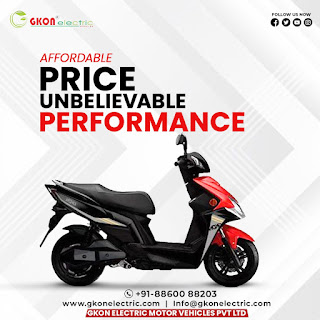Why buying an electric scooter is needed more than ever?
It appears that electric vehicles (EVs), particularly electric scooters, improve in performance every day. Electric two-wheelers and three-wheelers are viewed as the most likely method for EVs to expand in India, although from the bottom up. Since the previous fiscal year (FY2020) had the highest-ever number of sales of electric two-wheelers (1,52,000 units), both new and established domestic manufacturers are confident enough to provide more electric possibilities.
Recently, India has begun to experience the effects of the electric wave as a result of government policies and incentives. People are enthusiastic about electric cars, particularly scooters. As a result of technological advancements and government initiatives, it is now possible to purchase an electric scooter that can fulfil all of your urban needs. If you're still unsure about whether or not now is a good time to get an electric scooter, continue reading and we'll attempt to ease your mind.
Reasons why now is the greatest moment to acquire a low-cost electric scooter
1. Low Cost
With the price of gasoline and all BSVI-compliant gasoline scooters increasing, the price gap between e-scooters and gasoline scooters appears to be narrowing. Several brands, including Okinawa and Gkon Electric Scooters, have already closed the gap. "A standard 110cc gasoline scooter costs approximately Rs 85,000, whereas our pricing begins at Rs 80,000." There will be no registration fee." In addition, electric scooters are significantly simpler to maintain since, like electric vehicles, they contain fewer elements that can break.
2. Range doesn't matter
Interstate routes have no restrictions on electric scooters (if they are, you need to reconsider your choice of transport). They do not require a vast network of fast charging stations (in or outside of the city) because a home charging station is sufficient for daily commuting.
This is due to the fact that "high-speed scooters—basically anything capable of exceeding 25 kph—have a range of 85 to 90 kilometres. Some brands, such as Gkon, also manufacture scooters with removable, wall-chargeable batteries, similar to cell phones. Other e2W manufacturers are opposed to this notion, as they are concerned that it may cause the battery to degrade and lose power.
Instead, organisations such as Ather Energy leverage a developing network of experience centres and charging stations to facilitate urban riding. The majority of high-speed electric scooters can be charged using an AC charger in less than five hours.
3. EV is Future
Not only is e2W output increasing, but so is the ecology that facilitates its operation. Due to the rapidly decreasing price gap between gas scooters and electric two-wheelers, traditional two-wheeler manufacturers such as Hero Electric, Gkon E-Scooters, Bajaj, and TVS have created electric versions of their two-wheelers. Electric scooters will soon be available from Piaggio, Gkon E-scooters, and Ola Electric, among others.
They desire a share of the greatest two-wheeler market in the world. Because the supply chain will be more streamlined in the future, and because lithium-ion batteries and other components for EVs will be manufactured locally, costs will decrease even further.
Since the battery life is greater than the usual term of ownership, businesses like Ather want to streamline the market for secondhand scooters to make it much more transparent. Tarun Mehta states, "As a consumer, you should never question whether the motor or battery has been altered at any stage."
4. Quantity of subsidies
This week, the federal government introduced two new subsidy programmes. The subsidy rate for electric scooters has been hiked to Rs 15,000 per kWh as part of the second phase of the Faster Adoption and Manufacturing of Hybrid and EV (FAME) programme. To qualify for this subsidy, scooters must be capable of speeds of at least 80 km/h and 40 kph. In addition, its price from the manufacturer should not exceed Rs 1.50 lakh.
According to the Gujarat EV subsidy that was announced yesterday, the Gujarat government would provide a subsidy of up to Rs20,000 for electric two-wheelers. This is double the amount of any other state in the nation. Gujarat is now the least expensive place in India to purchase an electric vehicle.
5. You don't have to buy one in order to use one
As new ownership models become available, it is no longer necessary to purchase an EV to own one. Soon, Gkon electric scooter will provide leasing options spanning 13 to 36 months. Even though Gkon electric claims that its leasing plan is in its infancy and that distribution across the country has not yet been fully optimised, leasing models will soon become highly popular among individuals who desire temporary ownership.
Numerous businesses have partnered with financing companies to provide leasing solutions that are less per month than comparable EMI programmes. Customers can always purchase the scooter by paying the remaining debt or upgrade to a different model at the conclusion of the lease programme.




Comments
Post a Comment